#Bronisław Kaper
Explore tagged Tumblr posts
Text
Sullivan Fortner „Solo Game”
Artwork Records, 2023 Pierwsze solowe nagrania pianisty i kompozytora Sullivana Fortnera są jednocześnie jego debiutem w wytwórni Artwork Records. Album „Solo Game” to prawie 80 minut muzyki na dwóch płytach. “Solo” i „Game” to tak naprawdę dwa odrębne wydawnictwa, różniące się wykorzystanymi instrumentami, zaprezentowanym programem, podejściem do wykonania. Pierwsza z płyt zawiera fotepianowy…

View On WordPress
#Antonio Carlos Jobim#Artwork Records#Bronisław Kaper#Cecile McLorin Salvant#Duke Ellington#Fred Hersch#Fryderyk Chopin#Herbert Martin#Ira Gershwin#Jason Moran#Kurt Weill#Kyle Poole#Lorenz Hart#Michael Leonard#Neal Hefti#Randy Weston#Richard Rodgers#Stevie Wonder#Sullivan Fortner
0 notes
Text
Dread by the Decade: Gaslight
👻 You can support me on Ko-fi! ❤️

★★★★½
Plot: After moving into the home of her murdered aunt with her new husband, a woman begins to fear she is losing her mind.
Review: Though a bit more Hollywood than the original, it remains both a stirring murder mystery and disturbing exploration of psychological abuse.

Remake of: Gaslight (1940) Source Material: Gas Light by Patrick Hamilton Year: 1944 Genre: Psychological Horror, Mystery Country: United States Language: English Runtime: 1 hour 54 minutes

Director: George Cukor Writers: John Van Druten, Walter Reisch, John L. Balderston Cinematographer: Joseph Ruttenberg Editor: Ralph E. Winters Composer: Bronisław Kaper Cast: Ingrid Bergman, Charles Boyer, Joseph Cotten, Angela Lansbury, Barbara Everest, May Whitty

-----
Story: 4/5 - Tense, steady, and heartbreaking, though there are a few too many coincidences.
Performances: 5/5 - Bergman and Boyer are incredible, their toxic dynamic portrayed to a painfully realistic degree, and the rest of the cast is also excellent.
Cinematography: 5/5 - Perfect lighting and composition.

Editing: 4.5/5 - Enhances the slow but purposeful pacing.
Music: 4/5
Effects & Props: 3.5/5 - The jewels look a bit fake but everything else is solid.
Sets: 5/5 - Ornate and stunning.
Costumes, Hair, & Make-Up: 5/5 - Absolutely gorgeous. The costuming and hair for Paula is especially remarkable.
youtube
Trigger Warnings:
Very mild violence
Domestic and emotional abuse
Misogyny (period appropriate)
Mentions of institutionalization
Classism (period appropriate)
#Gaslight (1944)#Gaslight#American#George Cukor#psychological horror#Dread by the Decade#review#1940s#★★★★½
4 notes
·
View notes
Text
I don't throw around terms like 'pillar of film music' lightly, but Jerry Goldsmith's score to Chinatown (1974) really is one. For those who might not know, Goldsmith was brought in last-minute (try 10 days) to replace a rejected score by a composer named Phillip Lambro.
I listened to the rejected score today, and in some ways it's not as terrible as you'd think. But even listening to it in isolation there are moments that just don't work. The sax in the main title is too cloying and tries too hard to evoke the period while undermining the serious tone of the film. Also when it tries to be serious, it still tries too hard.
Also as a little thing that saps his credibility, Lambro's mariachi source music is just not mariachi music at all?!??! Lots of flutes and piano for a mariachi group ummm... Where are the trumpets?? Like it's not an esoteric style, and this is Los Angeles - if you don't know the 1st thing about mariachi this is a great place to learn about it!
Though there are things to be said in its favor, Lambro's score is bad. And from some reading I did, even decades later he didn't accept that and he was just a jerk all around it sounds like.
Learned that one'a my fave composers Bronisław Kaper saw a preview of Chinatown (1974) with Lambro's score and said the film was great but that the score dragged it down. Bronny Kaper knows quality, if he tells you it's bad, it's bad!
3 notes
·
View notes
Video
youtube
Invitation | Soundtrack Suite (Bronisław Kaper)
1 note
·
View note
Text
HERBIE HANCOCK - THE PIANO FULL ALBUM (1979)
HERBIE HANCOCK - THE PIANO FULL ALBUM (1979)Best Sheet Music download from our Library.Please, subscribe to our Library. Thank you!Track listingPersonnel: Herbie Hancock – acoustic pianoProduction credits
HERBIE HANCOCK - THE PIANO FULL ALBUM (1979)
https://www.youtube.com/watch?v=GMiKwEDd34s

As with Directstep (recorded one week previously), this album was recorded, and originally only released, in Japan. It was one of Hancock's most successful albums in Japan, perhaps because it was entirely solo piano. Hancock tackles jazz standards such as "My Funny Valentine", "On Green Dolphin Street" and "Some Day My Prince Will Come" while also performing four original compositions. This album was initially released exclusively in Japan and first issued there on CD in 1983. In 2004, over 25 years after its recording, the album was released with four additional alternate takes of the same session. It was the first and only (until 2014) of Hancock's Japanese releases available internationally. Track listing Side one No. Title Writer(s) Length - "My Funny Valentine" Richard Rodgers, Lorenz Hart 7:42 - "On Green Dolphin Street" Bronisław Kaper, Ned Washington 3:20 - "Some Day My Prince Will Come" Frank Churchill, Larry Morey 4:36 Side two No. Title Writer(s) Length - "Harvest Time" Herbie Hancock 4:48 - "Sonrisa" Herbie Hancock 3:40 - "Manhattan Island" Herbie Hancock 3:56 - "Blue Otani" Herbie Hancock 3:24 Total length: 31:26 CD Reissue bonus track (Columbia – CK 87083)No. Title Writer(s) Length - "My Funny Valentine" (Take 3) Richard Rodgers, Lorenz Hart 6:08 - "On Green Dolphin Street" (Take 2) Bronisław Kaper, Ned Washington 4:04 - "Some Day My Prince Will Come" (Take 3) Frank Churchill, Larry Morey 5:16 - "Harvest Time" (Take 3) Herbie Hancock 5:10 Total length: 52:04 Personnel: Herbie Hancock – acoustic piano Production credits David Rubinson – producer Fred Catero – engineer, mixing Mikio Takamatsu – mastering Yasohachi "88" Itoh and Keiichi Nakamura – production coordination Yusaku Nakanishi – art direction Kazumi Kurigami – cover photo Akira Aimi – photography The Piano Review by Thom Jurek Recorded after the funky fusion of Head Hunters, Thrust, Sextant, and other electric albums, and before the dawn of "Rockit" and more commercially viable and hip-hop-oriented material, Herbie Hancock took time out in 1978 to touch base again with his piano. Recorded completely solo, this set was issued only in Japan as the truly awful Feets, Don't Fail Me Now was issued stateside. A curious set, the first half of the album features Hancock playing jazz standards in truly elegant and restrained fashion. His treatments of "My Funny Valentine," "Green Dolphin Street," and "Someday My Prince Will Come" -- all tracks he performed as part of the Miles Davis Quintet -- are elongated, morphed, and beautifully woven together as a suite. The latter half of the recording is comprised of four tracks, "Harvest Time," "Sonrisa," "Manhattan Island," and "Blue Otani," all of which are originals. These pieces are concerned with Hancock's preoccupation with the piano as a solo instrument. They are composed as formalist treatments that are extrapolated upon at several different junctures, or "turning points," within them. They embody notions of classical music à la Anton Webern, blues, Erroll Garner's lyrical phrasing, and Bill Evans' harmonic sensibilities. They are, in sum, inseparable from one another and are usually performed as a suite. This is a stunning triumph for Hancock, and it's too bad that the album has never been issued in the U.S., as it would undoubtedly be a popular addition to his vast catalog. About the closest one can come are the tracks from here included in The Herbie Hancock Box. Maybe someday. Read the full article
#SMLPDF#noten#partitionmusicale#partitura#sheetmusicdownload#sheetmusicscoredownloadpartiturapartitionspartitinoten楽譜망할음악ноты
0 notes
Audio
“Follow Me” (Love Theme - wordless version) from Mutiny on the Bounty (1962)
7 notes
·
View notes
Audio
Max Raabe & Palast Orchester “All God’s Chillun Got Rhythm” (Walter Jurman/Gus Kahn/Bronisław Kaper, 1937)
#Max Raabe#Max Raabe & Palast Orchester#All God's Chillun Got Rhythm#1937#1930s#Walter Jurmann#Gus Kahn#Bronisław Kaper#Album: Heute Nacht oder nie - Live in New York#Carnegie Hall#2007#fav#my music
13 notes
·
View notes
Text
LUCILLE & DESI SOLVE A PARENT PROBLEM
November 22, 1952

Lucille Ball and Desi Arnaz were on the cover of TV Digest for the week of November 22, 1952. The inside article was titled “Lucille and Desi Solve a Parent Problem.”

“With a baby due in January, how does the show stay on the air?”
The article reveals that the past summer hiatus was spent ‘banking’ enough episodes of the show to last through March 1953. Using a photo of Lucy tumbling through an open window in “The Anniversary Present” (ILL S2;E3) aired on September 29, 1952 but filmed on May 9, 1952, the article asserts that physical comedy will be temporarily omitted from future episodes. A candid photo depicts Lucille and Desi relaxing with their infant daughter, Lucille Desiree.
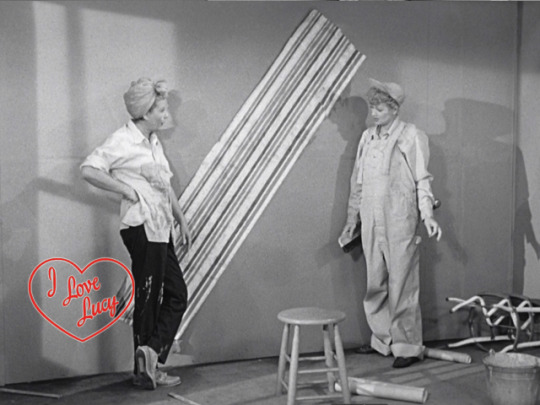
The inside listings include the original broadcast of “Redecorating” (ILL S2;E8) first aired on Monday, November 24, 1952. At the time of filming, Lucille Ball was already four months pregnant, although it was not yet part of the storyline on the show. To hide her condition, Lucy dressed in loose-fitting clothes throughout the episode. The big announcement would come two weeks later in “Lucy is Enceinte” (ILL S2;E10) aired on December 8, 1952.
IN OTHER NEWS...


Also on November 22, 1952, an Arlington Heights, Illinois, cinema offered a double bill of Cuban Pete (1944) starring Desi Arnaz and Lover Come Back (1946) starring Lucille Ball, which was retitled for its’ 1952 re-release Lucy Goes Wild to capitalize on the success of “I Love Lucy.” In the early 1950s cinemas were worried that competition from TV would make them obsolete.

The State Theatre in Richmond, Indiana, also wooed people away from the television into their popcorn palace, this time with second-run screenings of Look Who’s Talking (1941) and Too Many Girls (1940).
Nationwide, other cinemas were taking a similar tact with re-bookings of:
Fancy Pants (1950) in Bunkie, Louisiana and Hazleton, Pennsylvania
Sorrowful Jones (1949) in El Paso, Texas
A double bill of The Fuller Brush Man (1948) and The Fuller Brush Girl (1950) in Dorchester, Massachusetts
The Magic Carpet (1951) in Vancouver, British Columbia
Too Many Girls (1940) in Miami Beach, Florida
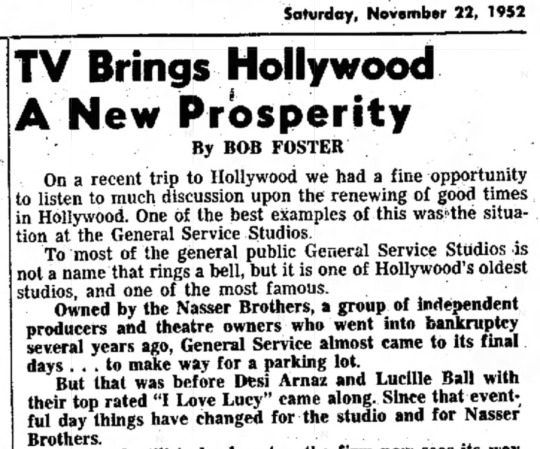
In a San Mateo, California, newspaper, Bob Foster credited the success of “I Love Lucy” with saving General Services Studios from bankruptcy.

Meanwhile, in Hawaii, one of Lucy and Desi’s favorite vacation spots, an appliance dealership in Honolulu was tempting potential viewers to buy a set in order to see “I Love Lucy” and other great shows when network television broadcasts finally arrived on the island in December 1952.

Groff’s Hardware in New Holland, Pennsylvania, took out a classified ad to let readers know they were selling the “I Love Lucy” baby doll.

Erkskine Johnson did a story on the ubiquitous laugh track, getting a quote from “I Love Lucy” DP Karl Freund.
SATURDAY’S SYNDICATED STORIES!


Lucy’s friend and future co-star Hedda Hopper claimed Lucy often wore ribbons in her hair, making her look like a Christmas tree. B. Kaper is composer Bronisław Kaper, who scored Without Love (1945) starring Lucille Ball and would also score Forever, Darling starring Lucy and Desi in 1956.
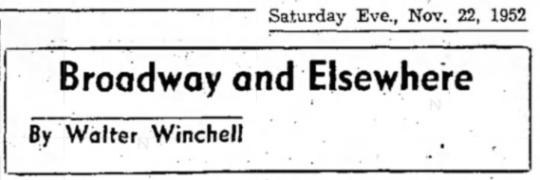

Walter Winchell’s “Broadway and Elsewhere” reported that the latest “I Love Lucy” episode was “30 minutes long and a smile wide...” There was no new episode the previous Monday (November 17, 1952), so Winchell must be referring to “The Courtroom” (ILL S2;E7) which aired on Monday, November 10, 1952.
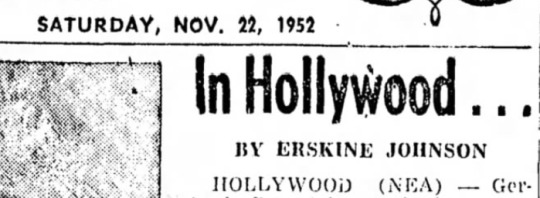
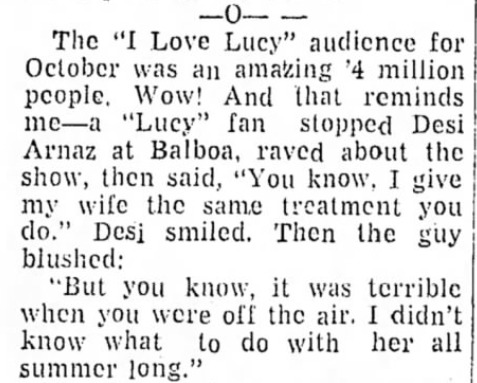
Erskine Johnson’s November 22, 1952, syndicated column “In Hollywood...” provided an anecdote about an “I Love Lucy” fan and the show’s record-setting viewership.

Dorothy Kilgallen’s syndicated column “Broadway: Gossip in Gotham” reported that Lucy and Desi were thinking about moving production of “I Love Lucy” to Cuba for tax reasons! As history knows, this never happened and sounds highly unlikely knowing Desi’s patriotic love of the USA.

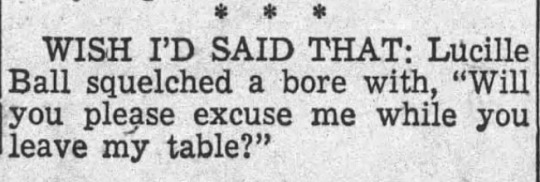
Earl Wilson’s November 22, 1952 syndicated column “It Happened Last Night” closed with a barb attributed to Lucille Ball: “Will you please excuse me while you leave my table?”
#Lucille Ball#1952#TV Digest#I Love Lucy#Desi Arnaz#Earl Wilson#Dorothy Kilgallen#Hedda Hopper#Erskine Johnson#Walter Winchell#TV
7 notes
·
View notes
Audio
On Green Dolphin Street – Miles Davis
Polish film composer Bronisław Kaper wrote On Green Dolphin Street for the film Green Dolphin Street. While the movie is generally panned by today’s critics, war-weary audiences of 1947 were ready for an extravaganza. It was the top box office draw of the year and won Academy Awards for visual and sound effects. The theme song however was not a hit, at least not until over a decade later, when Miles Davis recorded it with his sextet in 1958. It has become a jazz standard and was recorded by many of the big names in the years immediately following the Miles Davis release.
Although there are lyrics, written by Ned Washington, it is most often recorded as an instrumental, as the melody is quite difficult to sing in tune.
Alto Saxophone – Julian "Cannonball" Adderley Bass – Paul Chambers Drums – Jimmy Cobb Piano – Bill Evans Tenor Saxophone – John Coltrane Trumpet – Miles Davis
–Bozzie 🎷

#on green dolphin street#bronisław kaper#miles davis#Julian cannonball adderley#cannonball adderley#paul chambers#jimmy cobb#bill evans#john coltrane#ned washington
0 notes
Video
youtube
1958 Recording - On Green Dolphin Street -Miles Davis Sextet
On Green Dolphin Street is a 1947 popular song composed by Bronisław Kaper with lyrics by Ned Washington. The song was composed for the film Green Dolphin Street, which was based on a 1944 novel of the same name by Elizabeth Goudge, and became a jazz standard after it was recorded by Miles Davis in 1958.
PAUL LAURENCE DUMBAR CHAMBERS- double bass JIMMY COBB- Drums BILL EVANS-Piano CANNONBALL ADDERLEY- sax contralto JOHN COLTRANE-sax tenore MILES DAVIS-Trumpe
17 notes
·
View notes
Text
Tränen in der Geige - From Ich will dich Liebe lehren · Walter Jurmann - Bronisław Kaper - Daniel Hope - Quintett des Deutschen Kammerorchesters Berlin - Jacques Ammon - Maria Todtenhaupt
I found this song with #BeatFind
Tränen in der Geige - From Ich will dich Liebe lehren · Walter Jurmann - Bronisław Kaper - Daniel Hope - Quintett des Deutschen Kammerorchesters Berlin - Jacques Ammon - Maria Todtenhaupt
youtube
0 notes
Text
Chick Corea Akoustic Band “Live”
Chick Corea Akoustic Band “Live”
Concord Jazz, 2021 Muzyczny świat cały czas opłakuje odejście Chicka Corei. Postać wielkiego artysty przypominać nam będą jego nagrania, także wcześniej nie publikowane. Ich zwiastunem jest zapis koncertu akustycznego tria Corei. Wydawnictwo opracowane jeszcze przy współudziale pianisty. Chick Corea Akoustic Band zadebiutował na fonograficznym rynku w roku 1987 – także albumem koncertowym.…

View On WordPress
#Bronisław Kaper#Chick Corea#Concord Records#Dave Weckl#Duke Ellington#Gayle Moran Corea#John Patitucci#piano trio#Thelonious Monk
2 notes
·
View notes
Video
youtube
A música é "Just One of Those Things", uma canção popular escrita por Cole Porter para o musical “Jubilee” de 1935. No meio da apresentação aparece também a música "On Green Dolphin Street" (originalmente intitulada "Green Dolphin Street"), uma canção popular de 1947 composta por Bronisław Kaper com letra de Ned Washington. A canção foi composta para o filme Green Dolphin Street, que foi baseado em um romance de 1944 de mesmo nome por Elizabeth Goudge, e tornou-se um standard de jazz depois que foi gravado por Miles Davis em 1958.
A interpretação é nada mais nada menos do que com Mel Torme cantando (já falei isso, mas para mim o maior cantor de jazz de todos os tempos) & George Shearing (um fabuloso pianista cego) ao piano, uma dupla fabulosa, ao vivo em 18 de agosto de 1989 no Newport Jazz Festival.
Cara, isso é maravilhoso!...
0 notes
Text
Thinking about how the film composer Bronisław Kaper once said (paraphrasing) "There is a small club of people in Hollywood who at one point or another did *not* run the RKO studio."
7 notes
·
View notes
Text
Guarda "Lili | Soundtrack Suite (Bronisław Kaper)" su YouTube
youtube
0 notes
Text
TOP 100 FILM SCORES: Part VII (1900-99; ranked by year)
Though rankings vary from person to person (and even individually day to day), this might be a definitive personal list for the previous century. It still may change with media not yet seen, so feel free to suggest ones. Until then, enjoy the next three months.
#70: El Cid (1961) (Miklós Rózsa) https://www.youtube.com/watch?v=bf0JtLhm4Io
#69: Taras Bulba (1962) (Franz Waxman) https://www.youtube.com/watch?v=CovY06K3NnY
#68: To Kill a Mockingbird (1962) (Elmer Bernstein) https://www.youtube.com/watch?v=Ssz7Qmb7e1Q
#67: Mutiny on the Bounty (1962) (Bronisław Kaper) https://www.youtube.com/watch?v=zAv95sj3_Gc
#66: Lawrence of Arabia (1962) (Maurice Jarre) https://www.youtube.com/watch?v=ro7ustlPLuc
0 notes